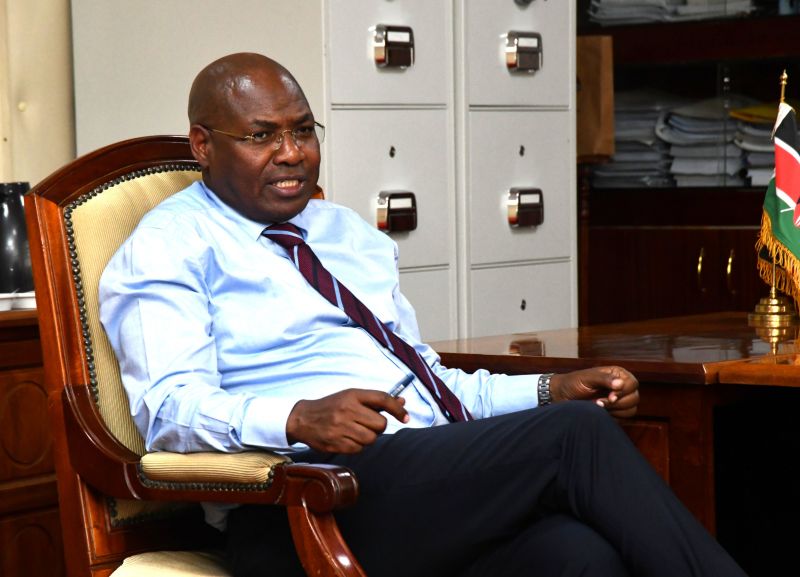Auditor-General Nancy Gathungu slams Office of the President for stalled small claims courts in Nairobi

Nancy Gathungu pointed out that responsibility for completing the courts in Dagoretti, Kasarani, Mihango and Huruma was handed over to the Judiciary through a deed of novation signed on June 29, 2023, but most projects remain incomplete.
The Auditor-General, Nancy Gathungu, has put the Office of the President on the spot for failing to complete the construction of Small Claims Courts across Nairobi, despite committing millions of shillings to the projects during the Nairobi Metropolitan Services (NMS) era.
In her 2023/2024 audit report, Gathungu pointed out that responsibility for completing the courts in Dagoretti, Kasarani, Mihango and Huruma was handed over to the Judiciary through a deed of novation signed on June 29, 2023, but most projects remain incomplete.
More To Read
- Over 16,000 in the dark as Kenya Power struggles to procure essential meters, transformers
- MPs push for urgent funding boost for Auditor General’s office
- Governor Sakaja unveils six-borough structure to enhance service delivery
- Judiciary faces Sh576.6 million pending bills amid budget review
- City Hall moves to recognise urban farmers in policy review
- Over 31,000 SGBV cases filed as courts improve response, Judiciary Report shows
The deed was between the defunct NMS, which initiated the projects, and the Judiciary, which transferred all construction obligations to the latter.
“The projects had been initiated under NMS as part of an intervention to expand access to justice within identified low-income areas. However, a review of the Project’s progress revealed several issues,” the report says.
In the case of Mihango Small Claims Court, the report reveals that a tender for completion was advertised on February 12, 2024, at an estimated cost of Sh78.4 million. Although six contractors submitted bids, a Tender Evaluation Report dated March 15, 2024, recommended that the process be terminated due to all bids being non-responsive.
As of the October 2024 audit, a new procurement process had not been started.
“Physical verification conducted in October 2024, revealed that the project remained stalled at 20% completion level, a stage that was achieved under NMS before the project was transferred to the Judiciary,” reads the report.
At the Kasarani site, a similar delay was recorded despite the tender being advertised on the same date as Mihango’s. A contract worth Ksh73.2 million was awarded following a professional opinion dated March 20, 2024, but by October, the court was still stuck at 20 per cent progress.
“This is a level achieved by the NMS before the project’s transfer to the Judiciary. The contractor was not on-site during the verification, and instances of vandalism on steel reinforcement bars were observed,” the report adds.
In Huruma, the process to procure the contractor began on July 6, 2023, and the project was advertised in February 2024 at Sh35.7 million. A contractor was eventually awarded the job at a contract sum of Ksh29.9 million, following approval on March 18, 2024. Though construction had started and Ksh5.4 million had been paid based on two certificates, work later slowed down.
The audit shows that a notice to terminate the contract was issued on September 25, 2024, due to delays. A physical inspection on October 22, 2024, found that the work was only 60 per cent done and the contractor was not present.
“In the circumstances, delay in completion of the projects may lead to cost escalations and value for money for resources spent may not be obtained,” the Auditor-General stated.
Beyond construction setbacks, the Auditor-General flagged other irregularities within the Office of the President, including unlawful salary deductions and vague confidential expenditure.
Payroll analysis for the year revealed that twenty employees were earning less than one-third of their basic salary, violating Section 19(3) of the Employment Act, which allows employers to deduct only up to two-thirds unless stated otherwise by the minister.
On confidential expenditure, the audit questioned the use of public funds for unspecified security operations after money was transferred to another agency. The report stressed the need for stronger guidelines to clearly define what qualifies as security-related expenditure and which institutions should be allowed to incur such costs.
It also recommended the establishment of internal oversight systems that would include proper budgets and financial summaries after operations to improve transparency and reduce misuse.
Top Stories Today













































